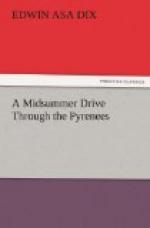The Moors at last swarmed to the attack. They were no cravens, the Moors; the fight grew rapidly desperate. The Franks performed wonders; they tingled with the Archbishop’s glorious assoilment:
“In God’s high name the host
he blest,
And for penance he gave them—to
smite their best!”
The twelve paladins slew twelve renowned Paynims; the mailed phalanx hewed its way into the infidels, laying them low by thousands. But thousands more were behind,—the reserve was inexhaustible; the “hundred thousand” were cut to pieces, when the Moorish king, hastily summoned, came up with a fresh army of myriads more. It was too much; little by little the Franks were beaten down, not back, and melted unyielding away. The peers fell one by one, upon heaps of the Moslem dead; the day wore on; of the twenty thousand Frankish warriors, but sixty men at length remained. Too late Roland would wind his horn; it was Oliver’s turn to disdain the now useless expedient. Roland sounded nevertheless:
“The mountain peaks soared high
around;
Thirty leagues was borne the sound.
Karl hath heard it and all his band;
‘Our men have battle,’ he
said, ‘on hand!’
Ganelon rose in front and
cried;
‘If another spake, I would say he
lied!’”
Again the desperate sound was faintly heard:
“‘It is Roland’s horn,’ said the Emperor,
‘And save in battle he had not blown!’
‘Battle,’ said Ganelon, ’is there none.
Old you have grown,—all white and hoar!
* * * * *
“‘He would sound all day for a single hare.’”
The third time, Roland blew; his nostrils and mouth are filled with blood, his temples crack with the stress:
“Said Karl: ‘That
horn is full of breath!’
Said Naimes: ‘’Tis Roland who travaileth,’”
—and the Emperor instantly gave the command to turn and rush to the rescue.
But the battle had gone too far. Again and again the little band of Franks clove its way into the enemy; the latter wavered, retreated, fell by hundreds, and came back in thousands. Roland’s tears fell fast over his dead companions:
“’Land of France, thou art
soothly fair!
To-day thou liest bereaved and bare.
It was all for me your lives ye gave,
And I was helpless to shield or save.’”
The last Frankish man-at-arms at length fell; only the three foremost paladins remained of all the host. But the Saracens dared no longer to approach them; they hurled their lances from afar. Spent and faint and bleeding, the three still stood out, but the death-wound of Oliver finally came; his vision swam, he swayed blindly on his horse. There is no more touching and beautiful incident in the whole range of song than this of his death:




